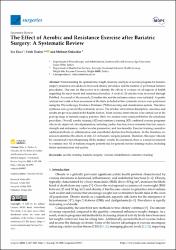| dc.contributor.author | Ekici, Ece | |
| dc.contributor.author | Özden, Fatih | |
| dc.contributor.author | Özkeskin, Mehmet | |
| dc.date.accessioned | 2023-10-03T13:47:21Z | |
| dc.date.available | 2023-10-03T13:47:21Z | |
| dc.date.issued | 2023 | en_US |
| dc.identifier.citation | Ekici, E.; Özden, F.; Özkeskin, M. The Effect of Aerobic and Resistance Exercise after Bariatric Surgery: A Systematic Review. Surgeries 2023, 4, 367–380. https://doi.org/10.3390/surgeries4030037 | en_US |
| dc.identifier.uri | https://doi.org/10.3390/surgeries4030037 | |
| dc.identifier.uri | https://hdl.handle.net/20.500.12809/11001 | |
| dc.description.abstract | Understanding the optimal time, length, intensity, and type of exercise program for bariatric surgery patients is crucial due to increased obesity prevalence and the number of performed bariatric procedures. Our aim for this review is to identify the effects of exercise on all aspects of health regarding the most recent and randomized studies. A total of 120 articles were reviewed through PubMed. As a result of the research, 11 studies that met the inclusion criteria were included. A quality analysis and a risk of bias assessment of the trials included in this systematic review were performed using the Physiotherapy Evidence Database (PEDro) scoring and classification system. Narrative syntheses were given for this systematic review. The articles’ intervention description, outcomes, and results are given in detail in the Results Section. Most exercise interventions were carried out in the post-op stage in bariatric surgery patients. Only two studies were conducted before the scheduled procedure. Overall, aerobic training (AT) and resistance training (RT) combined exercise programs effectively improved clinical parameters, including cardiac function, lower extremity function, muscle strength and endurance, cardiovascular parameters, and functionality. Exercise training caused no additional effects on inflammation and endothelial dysfunction biomarkers. In the literature, no research identifies the effects of only AT on bariatric surgery patients. Therefore, this aspect should be considered when interpreting all the studies’ results. In conclusion, there is a need for research to examine only AT in bariatric surgery patients and for general exercise training studies, including better randomization and quality. | en_US |
| dc.item-language.iso | eng | en_US |
| dc.publisher | Multidisciplinary Digital Publishing Institute (MDPI) | en_US |
| dc.relation.isversionof | 10.3390/surgeries4030037 | en_US |
| dc.item-rights | info:eu-repo/semantics/openAccess | en_US |
| dc.subject | Aerobic training | en_US |
| dc.subject | Bariatric Surgery | en_US |
| dc.subject | Exercise | en_US |
| dc.title | The Effect of Aerobic and Resistance Exercise after Bariatric Surgery: A Systematic Review | en_US |
| dc.item-type | article | en_US |
| dc.contributor.department | MÜ, Köyceğiz Sağlık Hizmetleri Meslek Yüksekokulu, Sağlık Bakım Hizmetleri Bölümü | en_US |
| dc.contributor.authorID | 0000-0001-6593-3758 | en_US |
| dc.contributor.institutionauthor | Özden, Fatih | |
| dc.identifier.volume | 4 | en_US |
| dc.identifier.issue | 3 | en_US |
| dc.identifier.startpage | 367 | en_US |
| dc.identifier.endpage | 380 | en_US |
| dc.relation.journal | Surgeries (Switzerland) | en_US |
| dc.relation.publicationcategory | Makale - Uluslararası Hakemli Dergi - Kurum Öğretim Elemanı | en_US |


















